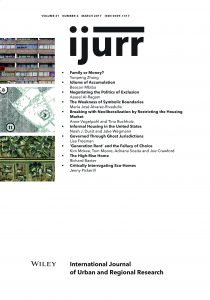The now widely used term ‘Generation Rent’ reflects the growing phenomenon in the UK of young people living in the private rental sector for longer periods of their lives. Given the importance of leaving home in youth transitions to adulthood, this is a significant change. It is further critical given the rapid expansion of the private rented sector in the UK over recent decades and the more limited rights that private tenants have. This article draws on qualitative evidence to highlight the impact this has on young people’s lives, and broader patterns of social-spatial inequality. Our research highlights that, whilst young people retain long-term preferences for homeownership, they nonetheless deconstruct this normalized ideal as a ‘fallacy of choice’, given its unachievability in reality. Influenced by the work of Foucault, Bourdieu and Bauman, we emphasize how these dominant norms of housing consumption are in tension with objective reality, since young people’s ability to become ‘responsible homeowners’ is tempered by their material resources and the local housing opportunities available to them. Nonetheless, this does not exempt them from the ‘moral distinctions’ being made, wherein renting is problematized and constructed as ‘flawed consumption’. These conceptual arguments advance international scholarly debates about the governance of consumption, offering a novel theoretical lens through which to examine the difficulties facing ‘Generation Rent’.
Details
Written by:
Kim Mckee, Tom Moore, Adriana Soaita & Joe Crawford
Digital Object Identifier (DOI)
10.1111/1468-2427.12445
About DOI

